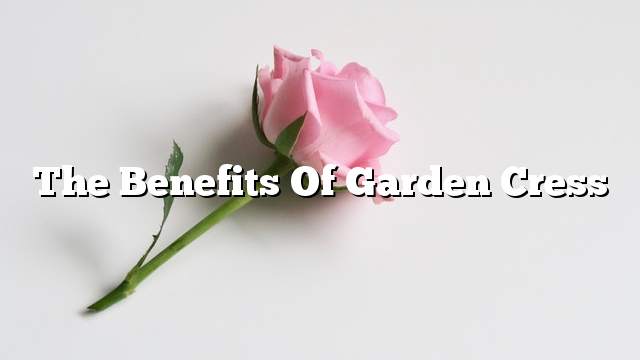Garden cress
Which is known as the name of Nasturtium. Garden cress is a plant that grows all over the world. The parts that grow above the surface of the earth are used as therapeutic materials and grow to a height of 20-40 cm. The leaves are thin and light green, and this plant is used fresh or dried during or shortly after the flowering season, but is often used freshly. One of the characteristics of this plant is its taste, which is close to the taste of radish, and its seeds, which have a thin crust that swells in water.
Active substances in cress plant
Human benefit from the parts of the cress different:
- In green leaves: Glucosinolates, and ascorbic acid (vitamin C).
- In seeds: glucosinolates, cucurbitacins, and cardiac steroids.
The benefits of garden cress
The benefits generated by the studies of cress plant include the following:
- Many studies have found an effective role for this plant in the fight against bacteria. It has had a completely inhibitory effect on the growth of 3 types of bacteria studied, but the antibacterial effect is largely dependent on the age of the plant used.
- It has been found to have an antiviral role in studies of experimental animals, but there are no human studies to show this effect.
- May have a role in the production of urine, but not proven scientific studies.
- People use the herb of cress to cure cough, lack of vitamin C, constipation, susceptibility to infection due to weak immune system, and in the treatment of accumulation and retention of fluids in the body, but there is insufficient scientific evidence on these uses.
- Garden cress is used in Indian medicine to treat vitamin C deficiency, liver disease, asthma, hemorrhoids, and to stimulate abortion, but there are no studies to prove these roles scientifically.
- Cress contains phytochemical compounds and phytosterols known to have an impact on cancer prevention. In a study carried out in 2013, the extract of alfalfa seeds found the ability to kill breast cancer cells.
- Studies have shown roles of glucosinol compounds in preventing cancer formation and prevention.
- Cress contains omega-3 and omega-6 fatty acids, which have many health roles. Many studies have shown omega-3 effects against many cancers.
- Plant sterols found in cress are antioxidants and anti-inflammatory agents.
- Phenolic compounds have many health roles, including prevention of oxidation, aging, cancer and cardiovascular disease.
- The garden cress can have roles in increasing energy exchange of the body, fighting toxins, energizing the body, stimulating libido, preventing pregnancy, and benefits for eyes and eyes.
- It can be helpful when used for compresses in joints and in leprosy (Hansen’s disease).
- It can be useful in treating sperm weakness.
- It can be helpful in treating asthma, coughing.
Toxicity and side effects
There are no side effects or health risks when using this plant in the appropriate doses, but the specific therapeutic doses should not exceed the known toxicity when used in high doses, although there is no scientific studies on its toxicity and symptoms, and high doses can cause irritation intestines, and caution should be taken especially in the following cases:
- Pregnancy and lactation : Due to the lack of sufficient information on the safety of eating the cress during pregnancy and lactation, it should be avoided in these cases.
- Diabetes : It can reduce blood sugar level in people with diabetes, so you should watch blood sugar and make appropriate adjustments of diabetes drugs in cases of the use of cress.
- Cases of low potassium level : Eating the cress seeds can lead to the loss of potassium from the body, leading to a significant reduction in its level in people with low potassium levels, so it should be used with caution in these cases
- Reduction of Blood pressure : Eating cress seeds can cause a decrease in blood pressure, which interferes with the ability to control the pressure of people at risk of falling and falling.
- surgeries : It can cause the consumption of cress seeds decrease in blood glucose during and after surgery, so should stop eating for at least two weeks before the date of any surgery.
Drug interactions
There is no information about the interaction between cress seeds and the drugs currently, and you should consult with your doctor before starting to take it and mention the medications you are taking.
Treatment doses
There is currently not enough scientific information about the cress seeds to determine the appropriate doses, so if taken care must be taken to follow the instructions of the product used carefully, and taking into account that eating in high quantities can cause toxicity.
Note Do not start taking any herbal or alternative medicine without consulting your doctor.
